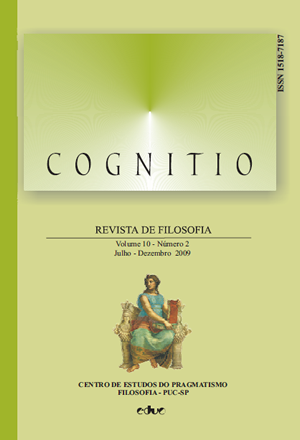A lógica como Resultado de um Processo Evolucionário
Palavras-chave:
Lógica, Lógica indutiva, Racionalismo crítico.Resumo
O livro de William Cooper, A Evolução da Razão (Cambridge University Press, 2001) apresenta a tese corajosa de que não apenas nossos poderes de raciocínio, mas os padrões lógicos pelos quais raciocinamos, e muitas de nossas conclusões, podem ser explicados como resultado de pressões evolucionárias. Quaisquer outros cânones de racionalidade, sugere ele, não seriam (no longo prazo) vantajosos. A história que Cooper conta começa com "estratégias de histórias da vida", e continua aquilo que é geralmente chamado teoria de decisão bayesiana, e depois compreende a teoria da probabilidade (aqui chamada "lógica indutiva"), lógica dedutiva clássica, e mesmo alguns sistemas não clássicos de dedução numa barganha.
Como racionalista crítico que não acredita que haja uma disciplina como a lógica indutiva e, ainda mais, que considera a diretiva para maximizar a utilidade esperada como não característica de (mesmo em conflito com) a racionalidade humana genuína, sinto pouco entusiasmo (para dizer o mínimo) a respeito de muitas das espantosas conclusões de Cooper. O objetivo deste artigo é identificar algumas das diferenças entre nós, e determinar se algum de nós está certo.









